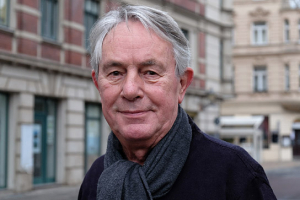Biography
Lew (born: Hans-Jürgen) Hohmann was born on 22 July 1944 in Schmiedeberg, Silesia (today: Kowary, Poland). His father died in the Second World War, and his mother moved with her son to Halle in the later GDR in 1945. After graduating from high school, Hohmann began studying mechanical engineering at the Technical University in Karl-Marx-Stadt (today: Chemnitz) and at the same time completed an apprenticeship as a lathe operator.
In 1965 he broke off his studies and began working as a lighting technician at the Chemnitz Opera House, followed by a traineeship at GDR television (1967). In 1968 he successfully applied to study directing at the Potsdam-Babelsberg Academy of Film and Television. After graduating in 1972, Hohmann became a junior director at the DEFA Studio for Documentary Films in the "Document" group, where he initially worked on existing subjects and realised commissioned works.
From the mid-1970s, Hohmann was also able to develop and realise his own material. His unconventional approach was already evident in one of his first films, "Warum sich der 60. Jahrestag der Oktoberrevolution nicht für die Vodkawerbung in der Bundesrepublik eignet" (GDR 1977), in which he combined interviews with West German trade unionists and street interviews with FRG citizens in a satirical way. His films about Martin Luther were also significant: in "Bürger Luther - Wittenberg 1508-1546" (GDR 1981) he showed the reformer more as a citizen of the town of Wittenberg than as a proto-socialist hero; in the short animated film "Copyright by Luther" (GDR 1983) he dealt with the work and conflicts of interest of the "media society" at the time of the Reformation.
Hohmann became known above all for his trilogy about the Wolf family, made between 1985 and 1998: the first was a documentary film made together with Wolfgang Kohlhaase about the director Konrad Wolf, who died in 1981, "Die Zeit die bleibt. Ein Film über Konrad Wolf" (GDR 1985), in which Wolf's brother Markus, who headed the GDR Foreign Intelligence Service at the Ministry of State Security for many years, also has his say. This was followed in 1988 by a film about Konrad Wolf's father, the doctor, communist and poet Friedrich Wolf: "Verzeiht, dass ich ein Mensch bin. Friedrich Wolf. Fragen an seine Kinder. Erinnerungen von Zeitgenossen". Hofer was also involved in the parallel publication of the book "Friedrich Wolf. Bilder einer deutschen Biographie", which was published at the same time. In 1998, almost ten years after the fall of the Wall, Hohmann finally directed a two-part documentary about Markus Wolf, entitled "Der Mann ohne Gesicht".
In the Wende years, Hohmann repeatedly dealt with the political and social upheavals in the GDR in his documentaries: "Aschermittwoch" (GDR 1989, together with Jochen Wisotzki) portrayed a single mother of six who tries to manage her family's everyday life as best she can. In collaboration with Joachim Tschirner and Klaus Salge, he made "Die Mauer" ("The Wall", 1991), "Ein schmales Stück Deutschland" (1991) and "Kein Abschied - nur fort" ("No Farewell – Just Go", 1991), about three East German families who fled to the West in autumn 1989. With Hans-Hermann Hertle he made the documentary "Beton und Devisen" in 1996, about "the Wall" as real estate.
After the dissolution of the DEFA studio, Hohmann founded the production company Realfilm with colleagues and from 1991 to 1997 acted as managing director of Tele Potsdam GmbH, whose shareholders were Alexander Kluge, Heiner Müller and Hans-Helmut Euler. The company offered employees of the dissolved DEFA the opportunity to continue making documentaries. Hohmann himself developed several TV formats at Tele Potsdam, for example the documentary series "Das Fenster" (24 episodes) and "Fremde Kinder" (over 30 episodes). He also took on a teaching position at the University of Leipzig.
From 1997 onwards, Hohmann worked as a freelance author and realised mainly historical material such as "Die Brandenburger. Chronik eines Landes" (1998), "Deutsche und Polen" (2004) and "Die Geschichte Mitteldeutschlands" (2005-2008), as well as biographical documentaries on Martin Luther (2003), Johann Sebastian Bach (2004), Hugo Junkers (2005), Reinhard Heydrich (2006), Alfred Brehm (2007) and Katharina von Bora (2009), in which he made historical events vivid through reenactment scenes. Hohmann has repeatedly been nominated for the Grimme Prize for his work. In addition, he was also involved as a concept developer and author in the accompanying web presences of some of his documentary series.
As an honorary professor for digital media/media production, Hohmann taught at the Anhalt University of Applied Sciences in Köthen and until 2012 also at the Magdeburg-Stendal University of Applied Sciences in the fields of film conception, documentary film, media law and international media business.
In 2020, Lew Hohmann began work on a cinema documentary after a break of several years: "Wenzel - Glaubt nie, was ich singe" is a cinematic portrait of the singer-songwriter Hans-Eckhardt Wenzel, who began his career in the early 1980s in the GDR and has also enjoyed success in West Germany since reunification. The film premiered at the Hofer Filmtage 2022 and was released in May 2023.
